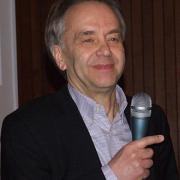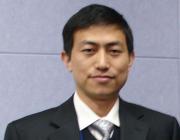
北京大学海外学者讲座
Overseas Scholar Lectures, Peking University
Univ.-Prof. em. Dr. Klaus Mainzer
Emeritus of Excellence
Technical University of Munich, Germany
克劳斯·迈因策尔教授,欧洲科学与艺术院院士、德国工程院院士、德国慕尼黑工业大学教育学院荣休教授
1.“Challenges of Complexity: Computational Revolution of Science and Society”
18 April 2018, 6:30-8:30 pm. Room 309, the First Teaching Building. Peking University.
2018年4月18日(周三)晚上6:30-8:30,北京大学第一教学楼309教室。
Nowadays, science and society produce a huge amount of data with increasing complexity – from cosmology and life sciences to ecology, economy and the Internet. Are there common laws behind pattern formation in complex systems of nature and society? The lecture explains fundamental laws of complex systems dynamics which can be used to handle crises and risks in nature and society. The increasing computer power opens new avenues to interdisciplinary explanation, simulation and prediction in natural and social sciences. Can the universe be understood as a gigantic supercomputer with algorithms generating complex pattern formation? This question already came up by prominent scientists of the 20th century (e.g., J. v. Neumann, K. Zuse and R. Feynman). The lecture will give a modern answer from a current point of view in science and technology.
References: K. Mainzer: Thinking in Complexity. The Computational Dynamics of Matter, Mind, and Mankind, Springer: New York 5th edition 2007 (Chinese translations: 1997 (1st edition), 2012 (5th edition)); K. Mainzer and L. Chua, The Universe as Automaton. From Simplicity and Symmetry to Complexity, Springer: Berlin 2011; K. Mainzer and L. Chua: Local Activity Principle: The Cause of Complexity, Imperial College Press: London 2013; K. Mainzer, The Digital and the Real World. Computational Foundations of Mathematics, Science, Technology, and Philosophy (World Scientific Singapore 2018).
2.“Artificial Intelligence and its Strategic Challenge for the Development of Mankind”
19 April 2018, 9:00-11:00 (Chinese Academy of Science CAS)
2018年4月19日(周四)上午9:00-11:00,中国科学院科技战略咨询研究院(北京市海淀区中关村北一条15号,100190),科研综合楼901会议室
Digitalization will change the world of science and technology completely. Exponentially growing computer power (Moore’s law) will lead to new kinds of supercomputers: China already has the most powerful computers of the world. We need this kind of computer power to manage the exponential increasing mass of data in research and development. In the Internet of Things (IoT), industrial production, trade, and services will be automated step by step with dramatic change of the labor world. In blockchain, central institutions (e.g., banks) will be replaced by decentral data bases to enable direct transactions between clients. Decision making will be improved by intelligent algorithms and data mining.
From the perspective of software, we need artificial intelligence and machine learning to handle the huge amount of data. In science and technology, machine learning algorithms will detect correlations and patterns of data as basis of new hypotheses, discoveries and innovations. In society, mobility will be improved by self-learning cars. Obviously, machine learning is very effective, but suffers from less understanding of its dynamics. In safety-critical systems, severe questions of responsibility arise with spreading automation. How can we improve reliability and trust in AI as service systems of mankind? In a world-wide competition of AI-technology, China and Europe should aim at a strategic partnership.
References: Yongxiang Lu (Ed.): Science & Technology in China: A Roadmap to 2050. Strategic General Report of the Chinese Academy of Sciences. Springer: Beijing 2010; K. Mainzer: Artificial intelligence and machine learning -- Algorithmic foundations and philosophical perspective (Chinese). In: Journal of Shanghai Normal University (Philosophy & Social Sciences Edition) 48(3) 2018; K. Mainzer: Artificial Intelligence (German: Springer 2016); K. Mainzer: Information (German: Berlin University Press 2016); K. Mainzer, The Digital and the Real World. Computational Foundations of Mathematics, Science, Technology, and Philosophy (World Scientific Singapore 2018).
3.“Artificial Intelligence and Machine Learning: Algorithmic Foundations and Educational Perspective”
20 April 2018, Friday, 14:00-16:00. Room 206. School of Education, Peking University.
2018年4月20日(周五)下午14:00-16:00,北京大学教育学院206教室。
In the past, artificial intelligence followed the digital paradigm of computability and the Turing test. But, in natural systems like human organisms, perception, action and cognition are based on analog abilities which cannot be completely reduced to the digital paradigm. In evolution, natural intelligence has emerged in brains with analog and digital principles which should be considered in education. Increase of natural intelligence was realized by increase of the density of more and more neurons in brains with slow synapses, analog weights, and sensible „wetware“ (cellular tissue + neurochemistry), but saving energy. In technology, increase of artificial intelligence was realized by increase of computational velocity and storage of digital computers with “robust hardware“ (e.g. silicon + semiconductor technology), but at the cost of high energy.
Mathematically, it can be proven that neural nets („brains“) with learning algorithms and appropriate automata and machines („computers“) are equivalent – from simple automata and networks up to analog networks with real computing. The lecture considers the computational foundations of analog systems with respect to applications of perception, action and cognition. The target of research should be the convergence of evolutionary (“analog”) and technical (“digital”) strategies in neuromorphic systems which combine technical efficiency with evolutionary advantages (e.g. saving energy). Therefore, education should aim at the symbiosis of analog and digital strategies.
References: K. Mainzer, From Embodied Mind to Embodied Robotics: Humanities and System Theoretical Aspects, in: Journal of Physiology (Paris) 103 2009, 296-304; K. Mainzer: Artificial Intelligence (German: Springer 2016); K. Mainzer: Information (German: Berlin University Press 2016); K. Mainzer, The Digital and the Real World. Computational Foundations of Mathematics, Science, Technology, and Philosophy (World Scientific Singapore 2018).
Klaus Mainzer (Brief Biography):
Klaus Mainzer studied mathematics, physics, and philosophy (1968-1972), Ph.D. (1973) and habilitation (1979) at the university of Münster; Heisenberg-scholarship (1980); 1981-1988 professor for foundations of exact sciences at the University of Constance, vice-president of the university of Constance; 1988-2008 chair for philosophy of science, dean, director of the Institute of Philosophy (1989-2008) and founding director of the Institute of Interdisciplinary Informatics (1998-2008) at the University of Augsburg; since 2008 chair for philosophy of science and technology, director of the Carl von Linde-Academy (2008-2015) and 2012-2014 founding director of the Munich Center for Technology in Society (MCTS) at the Technical University of Munich (TUM); since 2016 TUM Emeritus of Excellence; member of several academies and interdisciplinary organizations (e.g., The Academy of Europe/Academia Europaea in London, European Academy of Sciences and Arts in Salzburg, National Academy of Science and Engineering (acatech) in Berlin).
Research interests are foundations of mathematics and computer modelling, complex dynamical systems, complexity and computability, artificial intelligence (AI), computational brain, embodied robotics, big data, philosophy of science and technology, and future of digital societies.
简介:克劳斯·迈因策尔教授是世界知名的哲学家、科学与社会研究专家和复杂性系统学者,欧洲科学院院士、德国工程院院士、德国慕尼黑工业大学教育学院哲学与社会教席荣休教授、德国复杂性系统协会主席。曾任康斯坦茨大学副校长、奥格斯堡大学哲学学院院长和交叉信息科学中心主任、慕尼黑工业大学林德研究院院长和科技与社会研究中心主任等学术职务。
迈因策尔教授著述颇丰,先后出版了《复杂性中的思维(Thinking in complexity: The computational dynamics of matter, mind, and mankind)》、《人工智能》、《混沌》、《生命与机器》等20多本英文和德文专著。其中《复杂性中的思维》在全世界被再版发行10次,早在1999年就有了中文翻译版(清华大学曾国屏教授翻译)。他应邀在世界各地的学术会议、电视台和电台等讲演100多次,广受欢迎。他从复杂性视角分析技术和社会的关系、特别是大数据和人工智能时代的问题,富有丰富的哲学和历史情怀。
官方网页:https://www.emeriti-of-excellence.tum.de/a-z/klaus-mainzer
